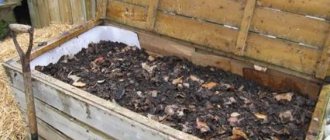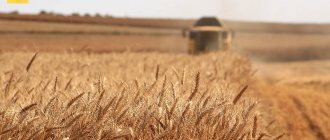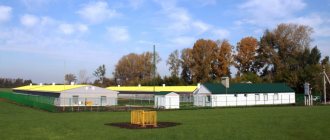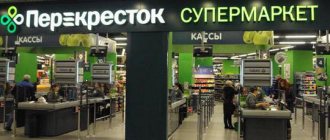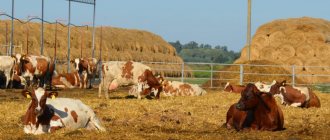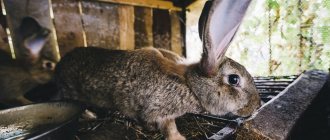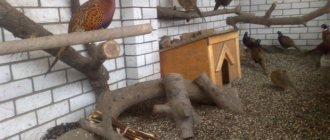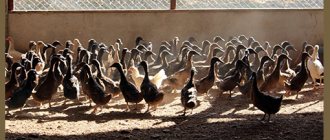In this material:
- What is vermicompost and where is it used?
- Vermicompost production technology
- Business subtleties and pitfalls
- Where to start the production of organic fertilizer Registration of activities
- Search for land
- Equipment
- Worms
- Staff
Biohumus, or vermicompost, is a fertilizer of natural origin, which is several times more effective than its organic counterparts. Its use helps increase productivity by up to 50%. This factor has a positive effect on the demand for this product – it is growing every year. Since the production of such a substance does not require significant costs, organizing this type of business will help to obtain a stable profit. A business plan for the production of vermicompost will help you thoroughly study all the intricacies of this activity.
What is vermicompost and where is it used?
Vermicompost is a natural organic product characterized by biological activity and environmental cleanliness.
This substance is formed due to the processing of organic residues in the soil by red Californian worms.
In this process, worms digest organic matter and then release waste products (coprolites) into the soil, which are most suitable for feeding vegetation.
Vermicompost contains many useful components: micro- and macroelements, growth hormones, soil antibiotics, enzymes and vitamins required for the full functioning of plants. The amount of nutritious organic matter contained in this product is 5–8 times greater than in simply rotted compost or manure; the fertilizer also contains no harmful microflora, weed seeds and helminth eggs. Vermicompost helps improve soil health and has the same color and smell as soil. When used, plants' immunity is increased and stress is relieved, and the taste of the fruit is improved.
In addition, vermicompost has the following properties:
- has a positive effect on the development of the root system;
- stimulates flowering and seed germination;
- prevents the accumulation of nitrates in plants.
This fertilizer is intended for feeding all garden crops, flowers and seedlings.
Main stages of production
Technological processes for the production of mineral fertilizers are very diverse, but basically consist of the same standard schemes characteristic of salt technology. Its goal is to separate complex systems containing several salt components. Mineral raw materials can be processed into salts in two ways:
- under the influence of high temperatures;
- "wet" way in suspensions and liquid media.
In accordance with this, in addition to the usual preparation of raw materials for processing, salt technology is based on two types of processes:
- thermochemical or heat treatment: batches or all kinds of firing;
- dissolution of substances followed by their recrystallization, associated with chemical treatment, separation of solutions and purification of impurities.
This is followed by firing, dissolution and leaching.
Vermicompost production technology
The production of this organic fertilizer is carried out in stages:
- A substrate for the worms is prepared, and the technology provides that their feeding can only occur in manure or burnt compost. To resolve this issue, you need to ask suppliers of food waste or cattle manure to allow the raw material to sit for some time. Meanwhile, a wooden container is prepared where the worms will be located.
- Manure, compost, rotten leaves and food waste are placed in the box and mixed thoroughly.
- During the ripening process of the mixed components, the required temperature and humidity level are maintained in the box. To do this, the mixture is covered with straw and regularly moistened with warm water and loosened for several days.
- Vermicultivation is carried out, in which worms are placed only in fully mature compost. Its quality is checked on a small number of worms; if there is a positive result, the rest are added to the box. It will take several months for acclimatization, and only then will the worms be able to produce vermicompost.
- The finished humus is separated from the substrate using a household sieve.
- The final stage of vermicompost production is packaging. Pre-weighed fertilizer is placed in plastic bags.
Preparation of the worm farm
Despite the similar breeding technology, in other respects large and small farms are very different from each other. Home production of vermicompost takes little time and helps get rid of household waste. The fertilizer from even one composter is enough to cultivate your personal plot of land.
What the breeder will need:
- 1 or 2 vermicomposters (industrial production or made at home from boxes);
- 1-2 families of worms;
- for food there will be enough waste from the kitchen, manure from livestock and plant residues from the garden;
- vermicomposters are placed in a heated utility room or living room, away from noise and direct heat sources;
- a minimum set of tools is required - a sieve, bucket, shovel, thermometer, acidity and humidity meter;
- Caring for pets takes little time, so the work of 1 person is enough.
Industrial production of vermicompost is a profitable business that requires, although not large, but significant capital investments. Before starting work on breeding worms, thorough preparation is needed.
What a future werm farmer needs to do:
- equip worm hutches in the form of piles in the open air or canopy;
- purchase the appropriate number of viable worm populations;
- pre-prepare feed taking into account the time for fermentation;
- renovate (construct) individual premises or allocate suitable plots of land;
- take care of plumbing and heating (or covering materials for the winter);
- stock up on a lot of tools and equipment - shovels, forks, carts, electric vermicompost separator; device for packaging finished products, transport, etc.;
- a large farm will require the labor of at least 2-3 people (depending on the scale of production).
It is more profitable for farmers to massively breed worms as an auxiliary production. They have a supply of livestock manure and waste from fields, so there is no need to buy feed for vermiculture.
Business subtleties and pitfalls
When organizing production and in its process, an entrepreneur may encounter the following difficulties:
- The site for work must be located at least 300 meters from residential buildings, and ideally on the outskirts of the village, which can complicate the search for a suitable area. This is due to the specifics of production, because organic waste is used as the main raw material in the production of vermicompost.
- Transportation of manure is usually carried out using utility trailers. Since this product is in a semi-liquid state, the procedure will be accompanied by significant losses.
- To sell fertilizer in small quantities, packaging will be required, and the purchase of appropriate equipment will require additional costs.
It is recommended that after opening a project, you start working with ordinary worms, thereby minimizing losses if for some reason the business turns out to be unsuccessful. During the promotion process, you can gradually acquire the California worm, but when using it, be sure to take into account that:
- The California earthworm, unlike the earthworm, does not burrow into the ground during the cold season. Therefore, during this period, the compost must be covered and the required temperature is maintained in the room.
- No rodents should appear in the production workshop, otherwise all worms will be destroyed. This requires regular preventative maintenance.
Due to the fact that individuals have the ability to reproduce quickly, they need to be regularly relocated to other areas.
How is vermicompost produced?
The use of natural organic matter as plant nutrition improves the environment, reduces labor costs for farmers and increases productivity. Vermicompost is a fertilizer that is a product of the processing of organic waste by earthworms. It is considered the most effective means for increasing soil fertility.
The technology and stages of vermicompost production are similar for any production volume, but differ in the size of the occupied space and labor costs, as well as the number and complexity of equipment. Beginning vermifarmers, at any scale of production, perform the following stages of work:
- preparation of the site and substrate;
- purchase, adaptation and stocking of livestock;
- creating acceptable living conditions for pets;
- feeding;
- periodic collection of vermicompost and resettlement of an increasing population of worms.
The vermifarmer's products are live worm biomass, breeding stock, dry vermicompost in granules and liquid preparations (vermichea, vermicompost solution) based on it.
Article about types of vermicompost at the link: “Types of vermicompost”
Where to start producing organic fertilizer
Business organization occurs in the following sequence:
- an in-depth market analysis is carried out;
- a business plan is drawn up;
- in wooden containers conditions are created that are optimal for the life of worms;
- preparing the room where the worms will be located;
- cattle manure that is in a rotted state is purchased;
- a mixture of compost, rotten leaves, manure and food waste is prepared;
- worms are acquired, and the Californian species can be replaced with the Vladimir one;
- worms settle into the prepared mixture.
This type of activity does not require licenses or special permits. At the same time, to work with wholesale buyers, you will need a quality certificate, which the entrepreneur will have to issue at the state certification and standardization center based on the application he submitted.
Registration of activities
When registering a business, you can use one of two forms: individual entrepreneur or LLC. For a small company with small production volumes, individual entrepreneur status will be sufficient. If you are planning a large-scale project and cooperation with large companies, it would be better to register an LLC.
Individual entrepreneur registration sequence:
- preparation of a package of documents (passport, tax identification number, registration application, receipt of payment of state duty);
- handling documents to the Federal Tax Service;
- choice of taxation system;
- indication in documents of OKVED codes corresponding to this activity;
- receiving a registration certificate within 5 working days.
The procedure for registering an LLC occurs in the same sequence; the package of documents in this case includes:
- statement;
- founders' passports;
- decision to establish a legal entity;
- charter of the company;
- information about the authorized capital;
- paid receipt of state duty.
Manufacturers of fertilizers cannot use the Unified Agricultural Tax as a tax burden, since vermicompost does not belong to the category of agricultural goods.
This type of business is suitable for the simplified taxation system (STS) with a rate of 6% of income.
When preparing documentation, the entrepreneur indicates OKVED code 20.15.8 (Production of fertilizers of animal and plant origin).
Search for land
The production of vermicompost can be called a rural type of business that absolutely does not fit into urban conditions. To mature compost, you will need land outside the city. It is advisable that there are no neighbors nearby, since during the process of rotting the raw materials emit an unpleasant odor. In addition, you will need a room equipped with ventilation and heating systems directly for the production of fertilizer, as well as a place where the finished product will be packaged and stored. The size of the production area must correspond to the scale of activity.
Equipment
The production of vermicompost does not require the purchase of intricate equipment. For such activities, an entrepreneur will need several positions:
- racks;
- composters (containers in which worms will live);
- drip irrigation system;
- temperature measuring devices;
- instruments for measuring soil moisture and acidity levels;
- sieve;
- tractor and trailer for transporting manure;
- auxiliary equipment (forks, shovels, buckets, carts);
- Packaging equipment.
Worms
For production, you can get earthworms yourself, but it is best to purchase them. In the production of vermicompost, two types of these individuals are used:
- Red Californian. The life expectancy is 4 times longer than that of the rain species, and the reproduction rate is 10 times. In 1 year, 2 individuals are capable of producing offspring in the amount of 1,500 individuals. The California worm adapts well to a new environment and is not susceptible to disease. Among its shortcomings, one can only name excessive thermophilicity.
- Vladimir worms. They also have the ability to reproduce quickly. Individuals have a large body, are not prone to diseases, and their life expectancy ranges from 5 to 16 years.
Staff
When calculating the number of employees, the entrepreneur will focus on the planned scale of production. The staff will include:
- supervisor;
- manager responsible for purchasing;
- Sales Manager;
- handyman;
- technologist;
- laboratory assistant;
- tractor driver;
- accountant.
Do I need to register a business?
If you are starting a home business, registering it will require additional cash injections. Not sure if things will work out? Then it’s better to first invest in finding clients and advertising. You will always have time to register your business. At first, you are unlikely to be able to conduct wholesale sales of finished products. But in order to establish cooperation with large agricultural enterprises in the future, registration is required! Wholesale sale of vermicompost will be possible only if there is appropriate documentation for the product. If you are opening a large manufacturing enterprise, register it according to all the rules.
Search for sales channels for finished products
The search for buyers is carried out through advertisements in print publications, on Internet sites or by distributing leaflets. The main product for sale is vermicompost; its buyers are:
- agricultural organizations;
- farms;
- flower shops;
- gardeners.
In addition to fertilizer, the company will be able to sell excess worms, which are of interest to:
- fishermen;
- poultry farms;
- zoological shops.
Thus, the company will not only get rid of surplus individuals, but will also receive income from their sale.
Buy or make it yourself?
Anyone can start producing vermicompost. Such an easy activity does not require special education or skills from the breeder. Mastery will come with experience working on your own vermifarm.
Those farmers who do not want or do not have the opportunity to breed worms can purchase vermicompost in dry or liquid form in specialized stores, on farms or on the Internet. The cost of the product is low, and the consumption is economical, since vermicompost contains nutrients in concentrated form.
Our online store offers customers vermicompost of our own production with delivery anywhere in the country. We produce and sell the highest quality products for organic farming at a competitive price.
Profitability and other financial indicators of the project
To open a production facility, you will need start-up investments, including the following items:
- business registration costs – 15,000;
- preparatory work in the production workshop - 400,000;
- rent of space – 20,000;
- rental of a tractor with a trailer – 15,000;
- purchase of equipment – 250,000;
- purchase of worms and manure – 220,000;
- advertising campaign – 30,000.
In total, you will need 950,000 rubles; when making planned calculations, it should be taken into account that financial indicators in each region may differ from each other.
Current expenses include:
- payment of utilities – 15,000;
- purchase of raw materials – 50,000;
- staff salary – 180,000;
- rent of space and tractor – 35,000;
- advertising – 5,000;
- unexpected expenses - 15,000.
The amount of monthly expenses will be 300,000 rubles.
The enterprise will be able to produce up to 400 tons of fertilizer per year and sell it at 15 rubles per kilogram, with revenue of 6,000,000 rubles (400 x 1000 x 15).
The monthly income will be:
6,000,000/12 = 500,000 rubles.
The monthly tax amount at a rate of 6% of income is calculated as follows:
500,000 x 0.06 = 30,000 rubles.
The enterprise's net profit per month will be:
500,000 – 300,000 – 30,000 = 170,000 rubles.
Profitability calculation: 170,000/500,000*100 = 34%.
The full payback period based on the above calculations will be from 5.5 to 6 years. During operation, the enterprise will sell excess worms and launch the production of vermicompost in liquid form, which will bring additional income, contribute to profit growth and reduce the payback period. In the future, you can buy production space and a tractor with a trailer as your own; this will reduce the amount of current expenses, since rental payments will not be made.
What equipment will you need to start a business?
The business plan for the production of vermicompost in Russia must include the cost of purchasing equipment. This is a significant expense item, but even a businessman who plans to carry out business at home cannot do without mechanizing the process.
To run a vermi farm at home, you will need the following set of tools and equipment:
- Wooden or plastic boxes for filling nutrient substrate.
- Scales.
- Mechanical sieve.
- Rakes, shovels, hoes.
This is a minimum set of equipment on which you will spend no more than 150,000 rubles. But to automate the process, you will need to purchase a packaging machine - its cost is from 1,000,000 rubles. At first, in order to avoid waste, you can put the finished fertilizer into bags manually, and seal the container with a special machine - its cost does not exceed 5,000 rubles.
To obtain granular vermicompost in industrial conditions, more “serious” equipment will be required, and, accordingly, higher costs. Large fertilizer production workshops are equipped with mechanical separators for sifting the substrate and obtaining a purer product, and lines for packaging and packing vermicompost. At the same time, in enterprises, instead of separate boxes with substrate, a multi-tiered installation is often installed - it takes up less space, which makes it possible to obtain large volumes of products in small areas. To buy equipment for the production of vermicompost in the liquid fraction, you will spend at least 1,000,000 rubles. We need special machines for extracting, fermenting and “washing” the fertilizer. For beginners in business, this is not the best option. At the same time, the technology for manufacturing the final product is quite complex and will require certain knowledge in the field of physical chemistry.
Plants for the production of nitrogen fertilizers as a business project.
The production of nitrogen fertilizers is raw material intensive. The competitiveness of the plant depends on optimizing raw material costs. At the initial stages of production, a large amount of ammonium nitrate is consumed. There are three types of ammonia raw materials - AK, A, B. For the production of fertilizers containing nitrogen, type B is most often used, since it contains a significant concentration of useful components.
You need to know that ammonia is a toxic liquid. To transport fertilizers you will need a special road or rail tank. If the center for supplying raw materials for the production of nitrogen fertilizers is located nearby, then it would be wiser to install a separate pipeline to move it.
Previously, coke or coke oven gases were used to produce ammonia, so it was produced in large metallurgical plants. In some factories it was considered a by-product and was not used due to excess. Today, ammonia is produced from waste from the oil refining and gas production industries. It is advisable to start the production of nitrogen fertilizers near such operating organizations.
So, let's start a business project with the production of granulated urea. This nitrogen fertilizer contains the largest amount of useful components. The technology for producing urea is complex and requires the use of the most modern special equipment. In this regard, the initial costs of launching the project increase significantly. The most important equipment for the production of urea is the granulation tower, inside which the ammonia solution is converted into urea granules. The ammonia solution is heated to 150 degrees and directed to the top of the tower. As it falls down, it is cooled by oncoming air flows.
